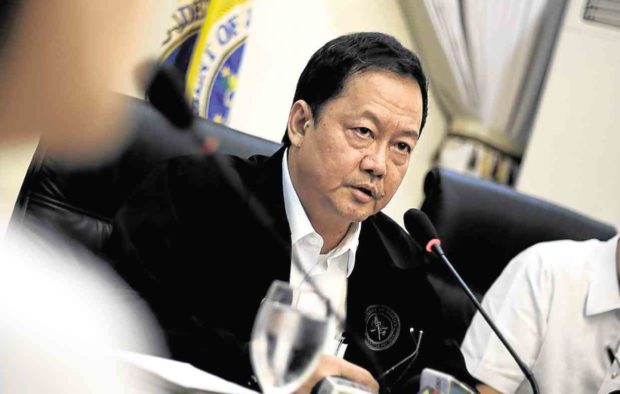MANILA, Philippines — Shaken by public outrage, the Department of Justice (DOJ) has suspended the processing of the early release for good conduct of thousands of prisoners, including former Mayor Antonio Sanchez of Calauan, Laguna province, who is serving nine 40-year terms for rape and murder.
Reports that President Rodrigo Duterte himself had been angered by the impending release of Sanchez hastened the DOJ decision to review the plan for early releases of convicts.
Justice Secretary Menardo Guevarra on Sunday said he had ordered the suspension of the recomputation of prisoners’ good conduct credit on their sentences until the Bureau of Corrections guidelines had been “carefully reviewed.”
Timetable
He said he would assign a DOJ task force to review the good conduct time allowance guidelines, in consultation with the corrections bureau and the Board of Pardons and Parole.
“We will fix a definite period to complete the review to avoid any undue prejudice to the rights of [prisoners] who have validly earned [good conduct time allowance]. We expect the processing to pick up greater speed once the guidelines have been reviewed and firmed up,” Guevarra said.
Even without a review, however, the DOJ appeared to have closed the door on Sanchez’s release before he has served 40 years, the maximum prison time allowed regardless of the number of sentences or convictions.
Guevarra maintained that those convicted of heinous crimes were disqualified from benefiting from the law that increased the grant of good conduct time allowance.
Sanchez, along with six of his henchmen, was sentenced in 1996 to seven terms of 40 years each for the rape and murder of Eileen Sarmenta and the murder of Allan Gomez, both students of the University of the Philippines Los Baños on June 28, 1993.
The former mayor was again sentenced in 1996 to two 40-year terms for the 1991 murder of Nelson Peñalosa and his son Rick.
The DOJ has no conflicting interpretations of Republic Act No. 10592, the expanded good conduct credit law, Guevarra said on Sunday.
He said that although the DOJ and the corrections bureau made a general statement that thousands of convicts, including Sanchez, might benefit from the law, the justice department made only one definitive statement—that those who had been convicted of heinous crimes were excluded from that law.
Thousands affected
The DOJ’s legal opinion would disqualify not only Sanchez but also thousands of other convicts who are serving time for heinous crimes, such as murder, rape, drug trafficking and kidnapping, and may have earned enough good conduct credit to gain early freedom.
Those who disagree with the DOJ’s interpretation of RA 10592 and hold that all convicted prisoners regardless of the crimes they have committed are eligible to benefit from it may take the matter up with Congress or the Supreme Court, Guevarra said.
“The DOJ will be glad to have this issue resolved with clarity and finality, either by a congressional amendment of its own act or by an interpretation rendered by the Supreme Court in a proper case brought before it,” he said.
Last week, Guevarra confirmed reports that Sanchez would be released soon.
He explained that Sanchez and some 11,000 other prisoners would walk free in the next two months because of the Supreme Court’s decision in June to retroactively apply RA 10592 to prisoners as well as inmates who were convicted even before the law was passed on May 29, 2013.
When met with public anger even from other government officials, including the President, over Sanchez’s early release from prison, the DOJ and the corrections bureau backtracked and said the mayor may not be released after all.
Guevarra on Thursday said RA 10592 excluded “recidivists, habitual delinquents, escapees and persons charged with heinous crimes” and gave his opinion that Sanchez’s drug offenses while incarcerated should exclude him outright from benefiting from the law.
He, however, also said he would leave it up to corrections bureau chief Nicanor Faeldon to evaluate Sanchez’s case.
Republic Act No. 7659, which imposed the death penalty in 1993, listed the crimes considered heinous and merited capital punishment.
When the death penalty was abolished in 2006, those heinous crimes were made punishable with reclusion perpetua—40 years in jail—instead.
The list of heinous crimes included treason; piracy and mutiny in the high seas; qualified bribery; murder, including parricide and infanticide; kidnapping and serious illegal detention; robbery with violence; destructive arson; rape; plunder; and violation of the Dangerous Drugs Act.
Guevarra said the DOJ would inform the Supreme Court about the “need to temporarily suspend” the processing of good conduct credit for prisoners.
In a unanimous decision on June 25, the Supreme Court ordered the immediate retroactive application of the grant of increased good conduct credit on all prisoners, whether convicted or undergoing preventive imprisonment.
The tribunal reversed the Aquino administration’s prospective application of the law, saying penal laws should be applied retroactively when they favor the accused.
200 released
Faeldon said last week that about 200 prisoners had been released since the Supreme Court handed down the decision.
He said that based on the corrections bureau’s initial assessment, only 1,000 of 11,000 prisoners eligible under RA 10592 would qualify for early release.
Among those who were not qualified were “high-profile” prisoners, as well as drug lords, and those who “provided sanctuary or supported drug peddlers” while incarcerated, he said.
Faeldon did not identify those prisoners who, he said, repeatedly violated prison rules. —WITH A REPORT FROM DEXTER CABALZA
